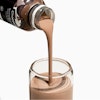🔥 Bestseller


High-protein meal shakes
35g protein
400 cal per bottle
From $58
/ $4.83 per bottle
2
Trying to unlock a better night’s rest? You’re not alone. While sleep is complex, research suggests that certain foods can help you sleep better. In this guide, we highlight the best foods that encourage sleep, along with the nutrients that promote restful, uninterrupted slumber.
Let’s start by saying sleep is a complex bodily function, and there are no magic foods that will instantly ship you off to the Land of Nod.
However, according to some research, there are associations to be made between your diet and good sleep. A small 2016 study in The Journal of Clinical Sleep Medicine found that eating high-fiber, low-saturated-fat meals was associated with deeper, more restorative sleep. A decade-long study on micronutrient inadequacy and sleep also found that individuals getting 7 hours or less of sleep regularly had a higher prevalence of inadequate intake for calcium, magnesium, and vitamins A, C, D, E, and K.
Bananas might be known as an energy-boosting snack, but they’re also rich in nutrients that may help relax your body before sleep. Magnesium and potassium support muscle relaxation, while vitamin B6 helps convert tryptophan into serotonin, the neurotransmitter that regulates melatonin, your sleep hormone.
Flaxseeds, along with sunflower seeds, almonds, walnuts, cashews, and hemp seeds, are great sources of tryptophan. A 2014 study found that a tryptophan-rich breakfast combined with bright light exposure raised evening melatonin levels. Another small 2013 study showed that eating tryptophan-enriched cereal at breakfast and dinner helped participants fall asleep faster and stay asleep longer.
Tart cherries (often found in juice or dried form) stand out for their natural melatonin content. A 2018 study from Louisiana State University found that tart cherry juice extended sleep time by 84 minutes in people with chronic insomnia. While research is still emerging, these sleep-promoting fruits also bring anti-inflammatory phytonutrients to the table.
Zinc plays a critical role in immune function, enzyme reactions, and nervous system support. A 2018 study observed that zinc supplementation improved both sleep quality and the time it took to fall asleep, especially in individuals with suboptimal zinc levels.
Not all carbs are created equal. A 2019 study found that women who consumed diets high in refined carbohydrates (white bread, sugary snacks, soda) were more likely to experience insomnia. In contrast, those who prioritized vegetables, fiber, and whole fruits were less likely to have sleep issues.
Complex carbs from whole grains and veggies not only offer fiber but can also help regulate blood sugar—supporting more stable energy and less night-time waking.
Choose whole, minimally processed foods with a balance of protein, healthy fats, and complex carbs.
Limit caffeine and high-sugar foods in the late afternoon and evening.
Consider nutrient timing: incorporating foods to help sleep (like a banana or almond butter on whole grain toast) as a pre-bedtime snack may support melatonin production.
Bananas – high in magnesium, potassium, and vitamin B6
Flaxseed – rich in tryptophan and healthy fats
Tart cherries – contain natural melatonin
Almonds – provide magnesium and protein
Whole grains – a fiber-rich source of complex carbohydrates
So, what’s the TL;DR? While there’s no single food that guarantees better sleep, consistently eating a balanced diet filled with nutrient-dense, sleep-promoting foods may help set the stage for better rest. Sleep better, live better—fuelled by Huel.
Get 15% off your first order of $50, plus insider access to expert tips, exclusive discounts, and the latest from Huel.
This site is protected by reCAPTCHA and the Google Privacy Policy and Terms of Service apply. You can unsubscribe at any time. Huel Privacy Policy.
